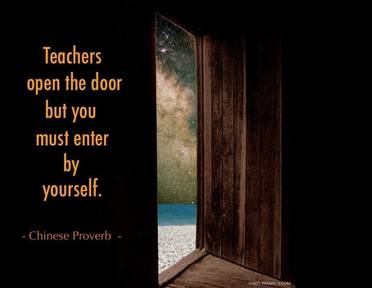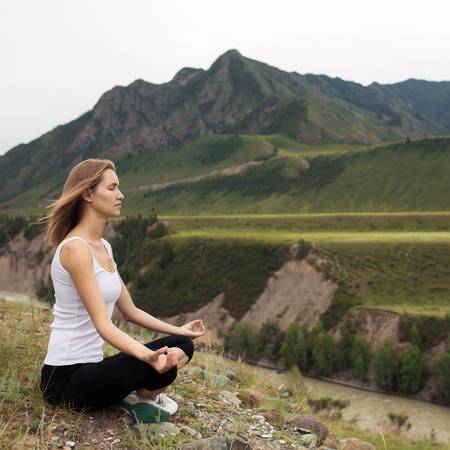When you think of “awareness”, do you suddenly picture yourself sitting cross-legged on a rock somewhere out in the wilderness? Like this?

For casual observers, a lot of the renewed interest in “mindfulness” leads us to believe that to pay attention we need to put in dedicated time in silent meditation. From this can arise a false understanding that awareness is something basically removed from our everyday lives. Not that there’s anything wrong with going on retreat, or spending a day (or even an hour) in meditation. These activities nourish our souls. But, what most of us don’t consider is that a practice of awareness can enter into every activity we do, all day long. What kind of awareness are we talking about? Perhaps that which is less spiritual, and more connected to the body – what FM Alexander called Psychophysical Awareness. (I give you the “jargon name” right off the bat here, so that if you read Alexander’s writing, or websites or books about his work, you’ll know what you’re reading about.)
The definition of the word “psychophysical”, according to Miriam Webster, is as follows:
1) of or relating to psychophysics - a branch of psychology concerned with the effect of physical processes on the mental processes of an organism
2) sharing mental and physical qualities
It’s the second part of that definition that Alexander teachers are particularly interested in.
So rather than being off considering lofty things on our mountaintop, psychophysical awareness is something we can make use of all day, every day. Where am I in physical space, when I’m off mentally thinking about my grocery list? What do my sit bones tell me after I’ve been sitting here writing on the computer for 20 minutes or so? Are my feet on the floor, or have I wrapped my legs in contortions around my chair?
This kind of awareness has tons of practical uses in our lives. By cultivating psychophysical awareness, we can start to figure out what we are doing habitually that is not in our best interests. If I go home from work every day with aching shoulders and traps, using my awareness skills will help me to check in on how I’m sitting at the computer or the piano, or how I’m driving my car. That way, I can change my position frequently enough to avoid all that pain and the heating pad later on.
I love to practice psychophysical awareness going to and from my car while running errands. Look at those amazing clouds! I can look at the sky, think “up”, and find a delicious physical release in my spine. Wow – I can hear a bird singing a beautiful, effortless song. Am I walking with my hips swinging as freely as that bird is singing? What else can I notice in my environment? What changes do I notice in myself in response? There's something wonderful about "being here now" in both mind and body.
Awareness is Step One in learning the Alexander Technique, and while it’s something a teacher will point out to you in a lesson, this part of learning the technique is mostly up to you. The more you practice psychophysical awareness outside of your lessons, the easier the rest of the principles (Inhibition and Direction) will become.
Some of us truly need a crash course in getting in touch with our bodies. You know those people when you see them – they look like floating heads that aren’t really attached to anything. Unless pain or bodily functions intervene, they are completely unconscious of their bodies for most of the day. There are people out there who haven’t thought about their feet (unless they hurt) in years. What is your relationship to the ground? How do you experience it?
If you’ve never had an Alexander Technique lesson, you’ll find they are full of questions just like these. It’s up to you to start to find the answers, and awareness is the key that unlocks the door to your journey.
Interested? Come see me at Alexander Technique of Decatur GA and we can start exploring awareness (as well as the other principles) together.
Next time….. Alexandrian Inhibition
The definition of the word “psychophysical”, according to Miriam Webster, is as follows:
1) of or relating to psychophysics - a branch of psychology concerned with the effect of physical processes on the mental processes of an organism
2) sharing mental and physical qualities
It’s the second part of that definition that Alexander teachers are particularly interested in.
So rather than being off considering lofty things on our mountaintop, psychophysical awareness is something we can make use of all day, every day. Where am I in physical space, when I’m off mentally thinking about my grocery list? What do my sit bones tell me after I’ve been sitting here writing on the computer for 20 minutes or so? Are my feet on the floor, or have I wrapped my legs in contortions around my chair?
This kind of awareness has tons of practical uses in our lives. By cultivating psychophysical awareness, we can start to figure out what we are doing habitually that is not in our best interests. If I go home from work every day with aching shoulders and traps, using my awareness skills will help me to check in on how I’m sitting at the computer or the piano, or how I’m driving my car. That way, I can change my position frequently enough to avoid all that pain and the heating pad later on.
I love to practice psychophysical awareness going to and from my car while running errands. Look at those amazing clouds! I can look at the sky, think “up”, and find a delicious physical release in my spine. Wow – I can hear a bird singing a beautiful, effortless song. Am I walking with my hips swinging as freely as that bird is singing? What else can I notice in my environment? What changes do I notice in myself in response? There's something wonderful about "being here now" in both mind and body.
Awareness is Step One in learning the Alexander Technique, and while it’s something a teacher will point out to you in a lesson, this part of learning the technique is mostly up to you. The more you practice psychophysical awareness outside of your lessons, the easier the rest of the principles (Inhibition and Direction) will become.
Some of us truly need a crash course in getting in touch with our bodies. You know those people when you see them – they look like floating heads that aren’t really attached to anything. Unless pain or bodily functions intervene, they are completely unconscious of their bodies for most of the day. There are people out there who haven’t thought about their feet (unless they hurt) in years. What is your relationship to the ground? How do you experience it?
If you’ve never had an Alexander Technique lesson, you’ll find they are full of questions just like these. It’s up to you to start to find the answers, and awareness is the key that unlocks the door to your journey.
Interested? Come see me at Alexander Technique of Decatur GA and we can start exploring awareness (as well as the other principles) together.
Next time….. Alexandrian Inhibition
Through Dec 24th, I am offering a holiday package deal on 4 one-hour lessons. Regularly priced at $320, these are offered at a package discount of $300. Consider an investment in being a better you as a present for yourself this year.
Click here to purchase, or to read a bit more on why Alexander lessons are a great present to give to someone you love.
Click here to purchase, or to read a bit more on why Alexander lessons are a great present to give to someone you love.

 RSS Feed
RSS Feed